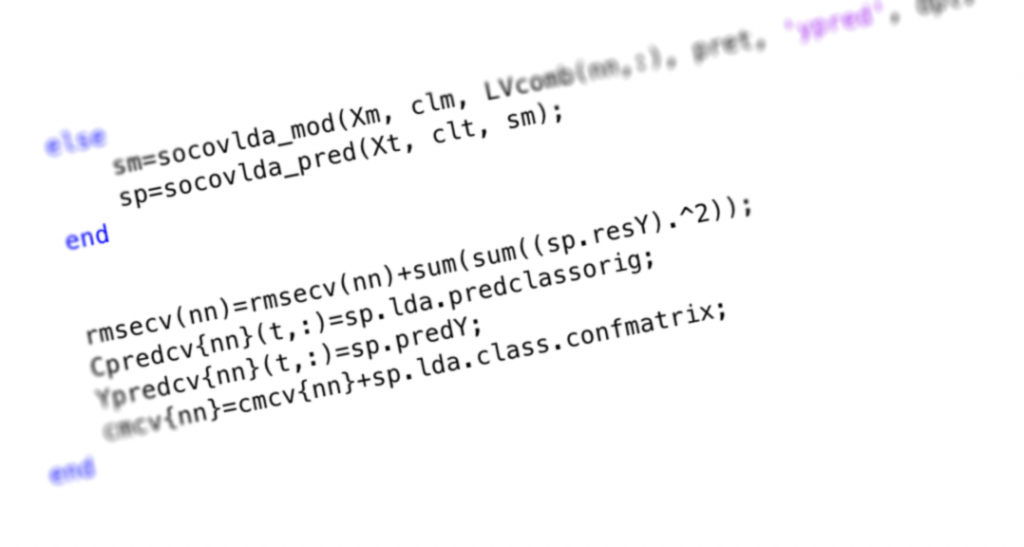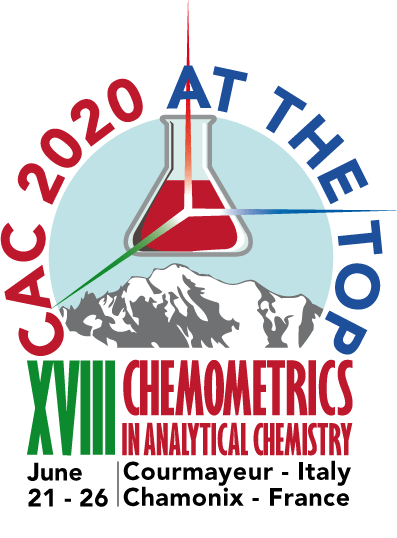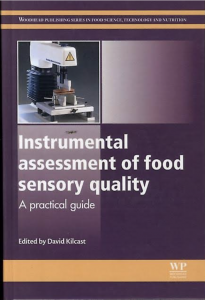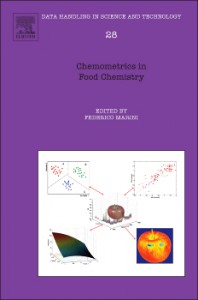
The algorithms page has been updated, with the addition of new Matlab functions and the revision of some of the older ones.
In particular, great effort has been put in making our functions for multi-block regression and classification (SO-PLS(-LDA) and SO-CovSel(-LDA)) more user friendly, richer in graphical outputs and generalizable to any number of predictor blocks.
Additionally, a set of functions for building and validating LDA models has also been added, while the ANOVA-TP toolbox has also been updated.

Together with Cyril Ruckebusch from the University of Lille (France), Federico Marini will co-chair the next edition of the Chemometrics in Analytical Chemistry (CAC2020) international conference.
CAC is the largest international conference dedicated to all aspects of chemometrics, data analysis and data science in analytical and applied chemistry. The conference historically attracts a diverse group of researchers from around the world.
After successful European editions of the conference in Budapest 2012 and Barcelona in 2016, that gathered more than 300 attendees each, and travel to Richmond in 2014 and Halifax in 2018, the 18th Chemometrics in Analytical Chemistry Conference that should have been held on the 21-26 of June, 2020 in Courmayeur (Italy).
However, the situation related to the COVID-19 emergency is currently affecting the organization of many conferences around the world and soon official decision will be taken also about the CAC.
More information will soon be available on the official website.
The next edition of the Italian Chemometrics Workshop will be hosted by RomeChemometrics and will take place in Villa Benedetta (Rome) on february 25th-27th 2015. Prof. Rasmus Bro from the University of Copenhagen will be our invited speaker. All the information and the registration form can be found here.
La prossima edizione del Workshop Italiano di Chemiometria sarà organizzata dal nostro gruppo e si svolgerà presso Villa Benedetta (Roma) nei giorni 25-27 febbraio 2015. Il prof. Rasmus Bro dell’Università di Copenhagen parteciperà come invited speaker. Ulteriori informazioni ed il modulo di registrazione posso essere trovate nelle pagine dedicate.
We are pleased to announce the inauguration of a new section (Algorithms), where we will upload MATLAB functions and toolboxes programmed by our group members, for performing different chemometric tasks. M-files will be made freely available for download.
Instrumental assessment of food sensory quality: A practical guide (edited by David Kilcast)
Chapter 11 (pp.313-352): Advances in analysis of instrumental food sensory quality data (M Bevilacqua, F Marini, F Biasoli and F Gasperi)
Food Protected Designation of Origin — Methodologies and Applications (edited by Miguel de la Guardia and Ana Gonzálvez)
Chapter 14 (pp.339-382): Classification Methods of Multiway Arrays as a Basic Tool for Food PDO Authentication (E Salvatore, M Bevilacqua, R Bro, F Marini, and M Cocchi)
It is a pleasure for us to announce the publication of the book Chemometrics in Food Chemistry, edited by Federico Marini.
This multi-authored monograph aims at covering as comprehensively as possible the issues related to the application and design of chemometric techniques to different ambits of food science. Its main intention is that of being usable both by food chemists that want to learn how the use of chemometrics can help them in many aspects of their work and by chemometricians having to deal with food-related problems. It is organized in two parts, a first part, that covers the theory and a second part presenting some selected applications of chemometrics to “hot topics” in food science. As this book aims to be read and used not only by “professional” chemometricians, all the topics, especially those in the theoretical part, are covered extensively starting from a beginner level up to an intermediate or advanced one. In the same theoretical part, description of the methods is accompanied by a wide use of examples taken from food science to illustrate how the different techniques can be fruitfully applied to solve real world food-related issues.


